- Home
- Milan Kundera
The Festival of Insignificance Page 3
The Festival of Insignificance Read online
Page 3
He was ten at the time. He and his father were alone on vacation in a rented villa with a garden and a swimming pool. It was the first time she had come to their house, after an absence of several years. They closed themselves into the villa, she and her former husband. For miles around the atmosphere was stifling from it. How long did she stay? Probably not more than an hour or two, during which time Alain tried to entertain himself in the pool. He had just climbed out when she paused there to say her good-byes. She was alone. What did they say to each other? He doesn’t know. He only remembers that she was sitting on a garden chair and that he, in his still-wet bathing trunks, stood facing her. What they said is forgotten, but one moment is fixed in his memory, a concrete moment, sharply etched: Seated in her chair, she looked intensely at her son’s navel. He still feels that gaze on his belly. A gaze that is difficult to understand; it seemed to him to express an inexplicable mix of compassion and contempt; the mother’s lips had taken the shape of a smile (a smile of compassion and contempt together); then, without rising from the chair she leaned toward him and, with her index finger, touched his navel. Immediately afterward she stood up, kissed him (Did she really kiss him? Probably, but he is not sure), and was gone. He never saw her again.
A Woman Steps Out of Her Car
A small car moves along the road beside a river. The chilly morning air makes even more forlorn the charmless terrain, somewhere between the end of a suburb and open country, there where houses grow scarce and no pedestrians are to be seen. The car stops at the side of the road; a woman gets out—young, rather beautiful. A strange thing: She pushes the door shut so negligently that the car must not be locked. What is the meaning of that negligence, so unlikely these days, with thieves about? Is the woman so distracted?
No, she doesn’t seem distracted; on the contrary, determination is visible on her face. This woman knows what she wants. This woman is pure will. She walks some hundred yards along the road toward a bridge over the river, a rather high, narrow bridge forbidden to vehicles. She steps onto it and heads toward the far bank. Several times she looks around her, not like a woman expected by someone, but to be sure there is no one expecting her. Midway across the bridge she stops. At first glance she appears to be hesitating, but, no, it’s not hesitation or a sudden flagging of determination; on the contrary, it’s a pause to sharpen her concentration, make her will steelier yet. Her will? To be more precise: her hatred. Yes, the pause that looked like hesitation is actually an appeal to her hatred to stand by her, to support her, not to desert her for an instant.
She lifts a leg over the railing and flings herself into the void. At the end of her fall, she slams brutally against the hardness of the water’s surface and is paralyzed by the cold, but after a few long seconds she lifts her face, and, since she is a good swimmer, all her automatic responses surge forward against her will to die. She plunges her head under again, forces herself to inhale water, block her breathing. Suddenly she hears a shout. A shout from the far bank. Someone has seen her. She understands that dying will not be easy and that her greatest enemy will be not her good-swimmer’s irrepressible reflex but a person she had not figured on. She will have to fight. Fight to rescue her death.
She Kills
She looks over toward the shout. Someone has leaped into the river. She considers: Who will be quicker: she, in her resolve to stay underwater, to take in water, to drown herself; or he, the oncoming figure? When she is half-drowned, with water in her lungs and thus weakened, won’t she be all the easier prey for her savior? He will pull her toward the bank, lay her out on the ground, force the water out of her lungs, apply mouth-to-mouth, call the rescue squad, the police, and she will be saved and ridiculed forevermore.
“Stop! Stop!” the man shouts.
Everything has changed. Instead of diving down beneath the water, she raises her head and breathes deeply to collect her strength. He is already in front of her. It’s a young fellow, a teenager who hopes to be famous, have his picture in the papers, he just keeps repeating: “Stop! Stop!” He’s already reaching a hand toward her, and she, rather than evading it, grasps it, grips it tight, and pulls it (and him) down toward the depths of the river. Again he cries, “Stop!” as if it is the only word he can speak. But he will not speak it again; she holds on to his arm, draws him toward the bottom, then stretches the whole length of her body along the boy’s back to keep his head underwater. He fights back, he thrashes, he has already taken in water, he tries to strike the woman, but she stays lying firmly on him; he can no longer lift his head to get air, and after several long, very long, seconds, he ceases to move. She holds him like that for a while longer; it is as if, exhausted and trembling, she is resting, laid out along him; then, convinced that the man beneath her will not stir again, she lets go of him and turns away toward the riverbank she came from, so as not to preserve within her even the shadow of what has just occurred.
But what’s going on? Has she forgotten her resolve? Why does she not drown herself, since the person who tried to rob her of her death is no longer alive? Why, now that she is free, does she no longer seek to die?
Life unexpectedly recovered has been a kind of shock that broke her determination; she no longer has the strength to concentrate her energy on dying; she is shaking; suddenly stripped of any will, any vigor, mechanically she swims toward the place where she abandoned the car.
She Returns to the House
Little by little she feels the water grow less deep, she touches her feet to the riverbed, she stands; she loses her shoes in the mud and hasn’t the strength to search for them; she leaves the water barefoot and climbs the bank to the road.
The rediscovered world has an inhospitable appearance, and suddenly anxiety seizes her: She hasn’t got the car key! Where is it? Her skirt has no pockets. Heading for your death, you don’t worry about what you’ve dropped along the way. When she left the car, the future no longer existed. She had nothing to hide. Whereas now, suddenly, she has to hide everything. Leave no trace. Her anxiety grows stronger and stronger: Where is the key? How to get home?
She reaches the car, she pulls at the door and, to her astonishment, it opens. The key awaits her, abandoned on the dashboard. She sits at the wheel and sets her naked feet on the pedals. She is still shaking. Now she is shaking with the cold as well. Her shirt, her skirt, are drenched with dirty river water running everywhere. She turns the key and drives off.
The person who tried to impose life on her has died from drowning, and the person she was trying to kill in her belly is still alive. The idea of suicide is ruled out forever. No repeats. The young man is dead, the fetus is alive, and she will do all she can to keep anyone from discovering what has happened. She is shaking, and her will revives; she thinks of nothing but her immediate future: How to get out of the car without being seen? How to slip unnoticed, in her dripping dress, past the concierge’s window?
Alain felt a violent blow on his shoulder.
“Watch out, you idiot!”
He turned and saw a girl passing him on the sidewalk with a rapid, energetic stride.
“Sorry!” he cried after her (in his frail voice).
“Asshole!” she answered (in her strong voice) without turning around.
The Apologizers
Alone in his studio apartment, Alain noticed that he was still feeling pain in his shoulder, and he decided that the young woman who had jostled him in the street so effectively, the night before last, must have done it on purpose. He could not forget her strident voice calling him “idiot” and he heard again his own supplicating “Sorry!” followed by the answering “Asshole!” Once again he had apologized over nothing! Why always this stupid reflex of begging pardon? The memory would not leave him, and he felt he had to talk with someone. He phoned Madeleine. She wasn’t in Paris, and her cell phone was off. So he punched in Charles’s number, and no sooner did he hear his friend’s voice than he apologized, “Don’t be angry. I’m in a very bad mood. I need to talk.”
“It’s a good moment. I’m in a foul mood too. But why are you?”
“Because I’m angry with myself. Why is it that I find every opportunity to feel guilty?”
“That’s not so awful.”
“Feeling guilty or not feeling guilty—I think that’s the whole issue. Life is a struggle of all against all. It’s a known fact. But how does that struggle work in a society that’s more or less civilized? People can’t just attack each other the minute they see them. So instead they try to cast the shame of culpability on the other. The one who manages to make the other one guilty will win. The one who confesses his crime will lose. You’re walking along the street, lost in thought. Along comes a girl, walking straight ahead as if she were the only person in the world, looking neither left nor right. You jostle one another. And there it is, the moment of truth: Who’s going to bawl out the other person, and who’s going to apologize? It’s a classic situation: Actually, each of them is both the jostled and the jostler. And yet some people always—immediately, spontaneously—consider themselves the jostlers, thus in the wrong. And others always—immediately, spontaneously—consider themselves the jostled ones, therefore in the right, quick to accuse the other and get him punished. What about you—in that situation, would you apologize or accuse?”
“Me, I’d certainly apologize.”
“Ah, my poor friend, so you, too, belong to the army of apologizers. You expect to mollify the other person by your apologies.”
“Absolutely.”
“And you’re wrong. The person who apologizes is declaring himself guilty. And if you declare yourself guilty, you encourage the other to go on insulting you, blaming you, publicly, unto death. Such are the inevitable consequences of the first apology.”
“Tha
t’s true. One should not apologize. And yet I prefer a world where people would all apologize—everybody, without exception, pointlessly, excessively, for nothing at all, where they’d load themselves down with apologies—”
“You say that in such a sad voice,” said Alain in surprise.
“For the past two hours I’ve been thinking of nothing but my mother.”
“What’s happening?”
Angels
“She’s sick. I’m afraid it may be serious. She just phoned me.”
“From Tarbes?”
“Yes.”
“Is she alone there?”
“Her brother lives in the house with her. But he’s even older than she is. I’d like to get into the car right now and go there, but it’s impossible. I have a job this evening that I can’t cancel. A really stupid job. But tomorrow I’ll go.”
“It’s odd—I often think about your mother.”
“You’d like her. She’s funny. She already has trouble walking, but we have a really amusing time together.”
“Do you get your love of clowning from her?”
“Maybe.”
“It’s strange.”
“Why?”
“From what you’ve always told me, I imagined her like a figure out of a Francis Jammes poem. Surrounded by suffering animals and aged peasants. Amid donkeys and angels.”
“Yes,” said Charles, “she is like that.” Then, after a few seconds: “Why did you say angels?”
“Why does that surprise you?”
“In my play—” He stopped for a moment, then: “You understand, my play for marionettes, it’s just a game, a crazy idea, I’m not writing it, I’m just imagining it, but what can I do if there’s nothing else that interests me? … Anyway, in the last act of this play, I imagine an angel.”
“An angel? Why?”
“I don’t know.”
“And how will the play end?”
“For the moment all I know is that at the end there’ll be an angel.”
“What does that mean to you, an angel?”
“I don’t know much about theology. I imagine an angel mainly from what people say to someone they want to thank for their goodness—‘You’re an angel.’ People often say it to my mother. That’s why I was surprised when you said you pictured her surrounded by donkeys and angels. That’s how she is.”
“I don’t know much theology either. I just remember that there are angels that are thrown out of heaven.”
“Yes. Angels thrown out of heaven.”
“Besides that, what else do we know about angels? That they’re slender …”
“True, it’s hard to imagine an angel with a big belly.”
“And that they have wings. And that they’re white. White. Listen, Charles, unless I’m mistaken, angels have no sex. That may be the key to their whiteness.”
“Could be.”
“And to their goodness.”
“Could be.”
Then after a silence, Alain said: “Does an angel have a navel?”
“Why?”
“If an angel has no sex, he’s not born from a woman’s belly.”
“Certainly not.”
“So he would be without a navel.”
“Yes, no navel, for sure …”
Alain thought about the young woman who, beside the swimming pool of a vacation house, had touched her index finger to the navel of her ten-year-old son, and he said to Charles, “It’s strange. Me too, for a while now, I keep picturing my mother … in all kinds of possible and impossible situations—”
“All right now, friend, let’s stop there! I’ve got to get ready for this damn cocktail party.”
PART FOUR
They Are All in Search of a Good Mood
Caliban
In his first occupation, which at the time he saw as his life purpose, Caliban was an actor; that was the profession registered in black and white on his identity papers, and now it was as an actor with no bookings that he had been drawing unemployment benefits for a long while. The last time he was seen on a stage, he was playing Caliban the savage in Shakespeare’s The Tempest. His skin smeared with brown makeup, a black wig on his head, he howled and capered about like a madman. His performance had so delighted his friends that they decided to call him by the name that would remind them of it.
That was already a long time ago. Since then, theaters had not cared to hire him, and his benefits diminished year after year, as indeed they did for thousands of other unemployed actors, dancers, singers. Then Charles, who earned his living by managing social events for private clients, took him on as a waiter. Caliban could thus make a little money, but besides, still an actor seeking to regain his lost mission, he also saw the work as an occasion to shift identities from time to time. His aesthetic ideas were a little naive (wasn’t his patron saint, Shakespeare’s Caliban, naive too?), and he believed that an actor’s feat was the more remarkable the further the character was from his actual life. With this in mind, he insisted on working with Charles not as a Frenchman but as a foreigner who spoke only a language no one around him would understand. When he had to pick a new homeland, perhaps because of his somewhat swarthy skin tone, he chose Pakistan. Why not? Choosing a homeland—nothing easier. But inventing its language, that is difficult.
As an improvisation, try talking in a fictional language for even thirty seconds! You’ll keep repeating the same sounds time and again, and your babble will be instantly unmasked as a sham. Inventing a nonexistent language requires giving it some acoustical credibility: creating a particular phonetics and never pronouncing an a or an o as the French do; deciding on which syllable the stress will regularly fall. It is also recommended, for a natural sound, to devise an underlying grammar for these meaningless sounds, and to determine which word is to be a verb and which a noun. And when the game involves a pair of friends, it is important to work out the role of the second person, the Frenchman—in this case, Charles; though he does not speak this Pakistani, he must know at least a few words of it so that in an emergency the two can communicate without using a word of French.
That had been difficult but entertaining. Alas, even the most entertaining prank cannot evade the law of growing stale. The two friends enjoyed the game for the first few parties, but rather soon Caliban began to feel that all that laborious masquerading served little purpose, for the guests showed no interest in him and, what with his incomprehensible language, did not listen to him, settling for simple gestures to indicate what they wanted to eat or drink. He had become an actor without an audience.
White Jackets and the Portuguese Girl
They reached D’Ardelo’s apartment two hours before the party was to begin.
“Madame, this is my assistant. He is Pakistani. I’m sorry, but he doesn’t speak a word of French,” said Charles, and Caliban bowed ceremoniously before Madame D’Ardelo and uttered a few incomprehensible phrases. Madame D’Ardelo’s rather blasé indifference, with no attention to the information, confirmed Caliban’s sense of the pointlessness of his laboriously invented language, and he began to feel a touch of melancholy.
Fortunately, immediately following this disappointment, a small pleasure consoled him: The maid whom Madame D’Ardelo had ordered to make herself useful to the two waiters could not take her eyes off so exotic a creature. She spoke to Caliban several times, and when she came to understand that he knew only his own language, she was at first disconcerted and then strangely relaxed. For she was Portuguese. Since Caliban spoke to her in Pakistani, she had a rare chance to drop French, a language she disliked, and to use only her own native tongue, like him. Their communication in two languages neither understood brought them close.

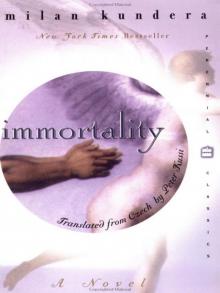 Immortality
Immortality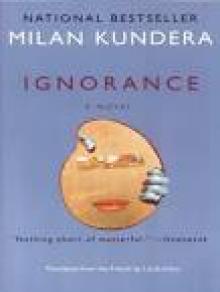 Dr. Havel After Twenty Years
Dr. Havel After Twenty Years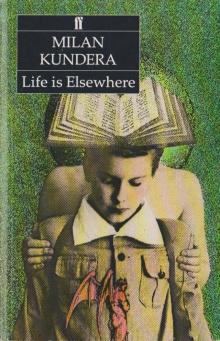 Life Is Elsewhere
Life Is Elsewhere Laughable Loves
Laughable Loves Symposium
Symposium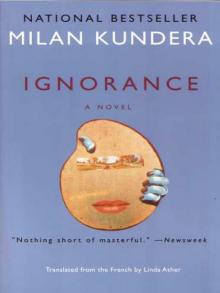 Ignorance
Ignorance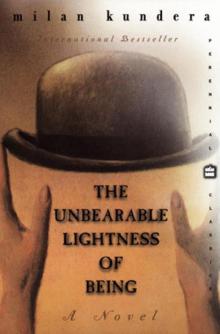 The Unbearable Lightness of Being
The Unbearable Lightness of Being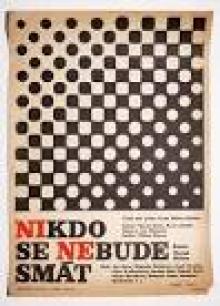 Nobody Will Laugh
Nobody Will Laugh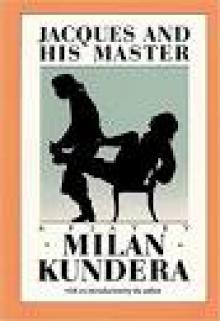 Jacques and His Master: An Homage to Diderot in Three Acts
Jacques and His Master: An Homage to Diderot in Three Acts The Golden Apple of Eternal Desire
The Golden Apple of Eternal Desire Eduard & God
Eduard & God Slowness
Slowness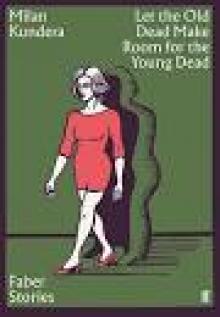 Let the Old Dead Make Room for the New Dead
Let the Old Dead Make Room for the New Dead Farewell Waltz
Farewell Waltz Testaments Betrayed: An Essay in Nine Parts
Testaments Betrayed: An Essay in Nine Parts